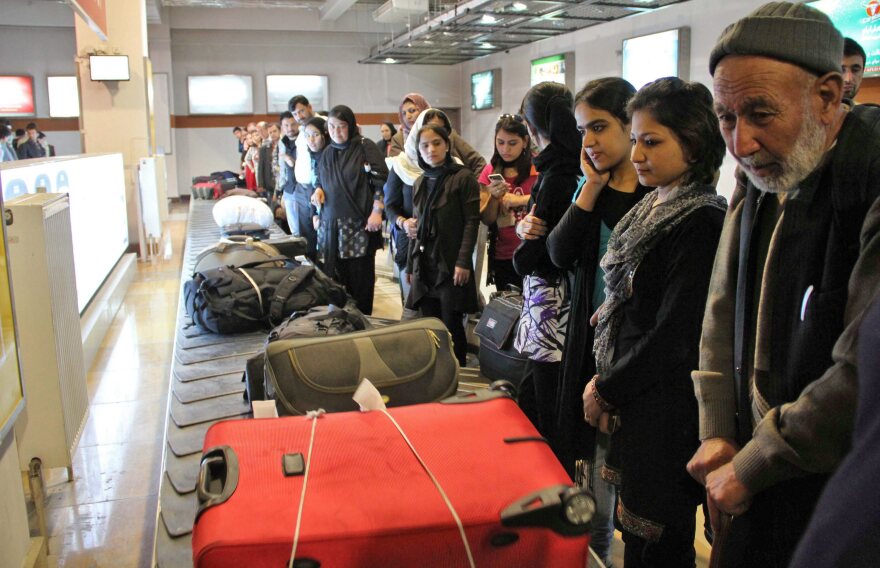Convulsed by war and civil strife for decades, Afghanistan has experienced some of the largest ebbs and flows of migration anywhere in the world.
It began with the Soviet invasion in 1979, which sent millions of Afghans fleeing to Iran and Pakistan. When the Taliban were driven from power in 2001, many Afghans began returning home.
Now, the country has hit another milestone: For the first time since 2002 and the beginning of the current war in Afghanistan, the country has a negative migration rate — more Afghans are leaving than returning.
The uncertainty of what Afghanistan will look like after 2014, when the NATO forces leave, has many Afghans heading for the exits, or at least trying to, and some are paying huge sums of money to get out any way they can.

Aziz Momand is a 30-year-old taxi driver in Kabul. Sitting in his road-worn Toyota Corolla wagon in the center of the city, he explains his desire to leave.
"I have concerns that 2014 is arriving and people talking that maybe the situation get worse," he says. "Already business is down."
Momand says he's been thinking of leaving for the past year, ideally to a Scandinavian country where, he says, asylum policies are liberal. He says it's too difficult to get a visa, so he's been speaking with people about smuggling his family to Sweden.
"The first step is to go to Iran, then somebody smuggles us to Turkey, and then to Greece, and then to other parts of Europe," he says.
The only problem with this approach, Momand says, is that to get his whole family out, it will cost nearly $50,000 — a fortune for most Afghans.
"If I have that much money, I would have already been there," he says.
Even if he does get the money together, there's no guarantee his family will make it safely to Sweden or avoid deportation.
"The smugglers, they do their own propaganda. It's a business, and so they are saying, 'It's easy to get here; we'll make sure you have a great future,' " he says.
The Latest Outward Flow
It's just the latest wave of emigration in Afghanistan's turbulent history. At the height of the Soviet occupation in the 1980s, the UNHCR, the U.N. refugee agency, estimates that there were more than 6 million Afghan refugees in Iran and Pakistan alone — and almost 1 million more in other parts of the world.
According to the UNHCR, Afghan refugees accounted for slightly less than half the world's total refugee population.
By the early 1990s — after the Soviet withdrawal — an estimated 2 million to 3 million Afghans had been repatriated, though the rise of the Taliban meant that at the same time, others were fleeing. The last major shift in the flow of migration occurred after the fall of the Taliban in 2001. In 2002 alone, about 2 million Afghans returned, according to the UNHCR.
Now, that flow has reversed once again.
Marco Boasso heads the International Organization for Migration office in Afghanistan. He says concrete data about the numbers of Afghans leaving today are hard to come by, especially given the criminal nature of trafficking.
"What we do know is that the arrivals in Europe are unprecedented," he says, noting that arrivals in Europe during the Soviet occupation and civil war were just 20 percent to 30 percent of today's numbers.
Boasso doesn't think the country will fall apart after NATO troops withdraw in 2014, and the IOM is pushing the government to create economic opportunities for people to stay in Afghanistan. Still, he says exodus will continue.
"We will see more movement of people ... in 2014 because anxiety is there; there is a lot of uncertainty," he says.
Burgeoning, And Pricey, Black Market
Embassies in Kabul are reluctant to discuss on the record whether more Afghans are applying for visas. Many European countries don't issue visas in Kabul, and Afghans have to travel to Iran or Pakistan to apply. Turkish officials did say they have made the application process more cumbersome to discourage all but serious travelers.
But there's another option for Afghans flush with cash: buying visas.
NPR's Afghan reporters visited several travel agents in Kabul, and were told that Turkish visas can be bought under the table for $4,100. Russian visas are $17,000. West European visas are most prized and cost at least $25,000.
These are real visas, the reporters were told, but none of the agents would explain how the visas are issued and who gets paid off along the way.
NPR's Aimal Yaqubi contributed to this report.
Copyright 2020 NPR. To see more, visit https://www.npr.org. 9(MDAwMTM1NDgzMDEyMzg2MDcwMzJjODJiYQ004))


